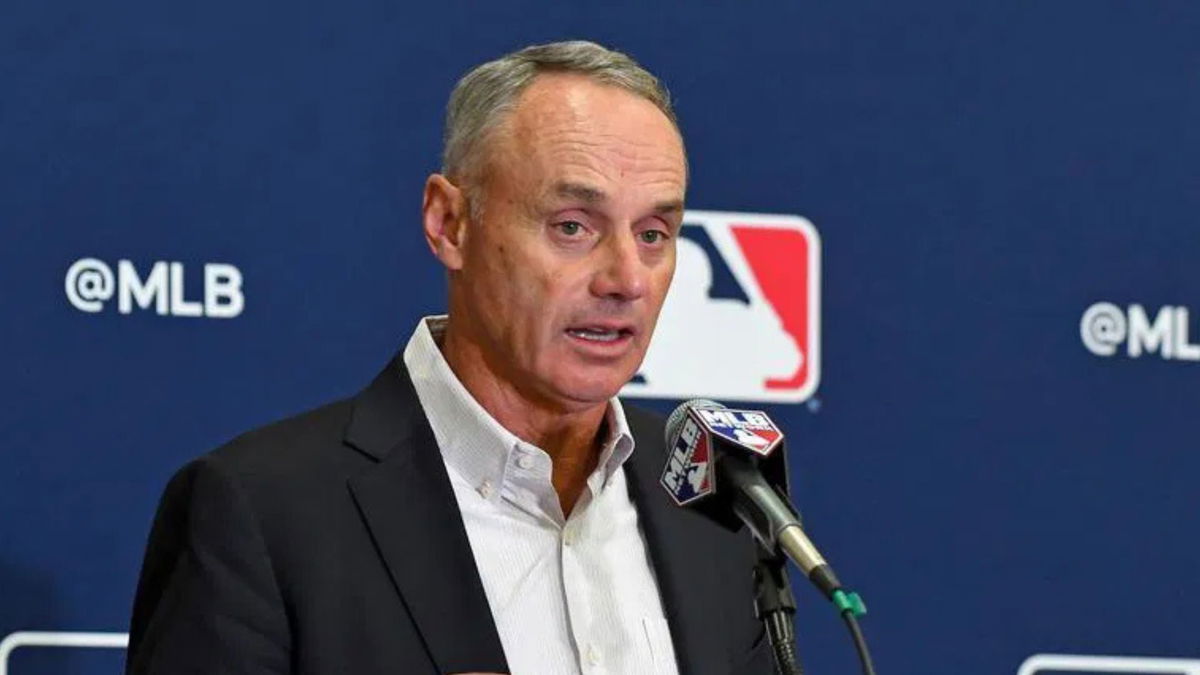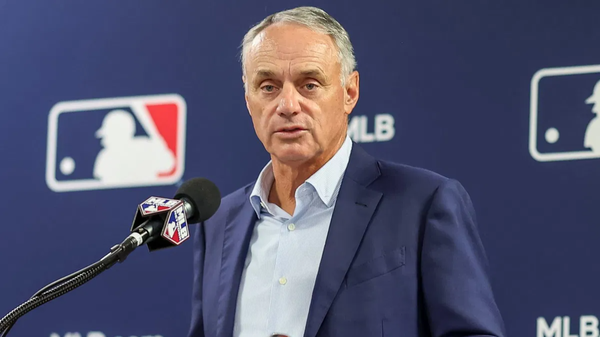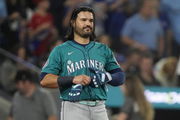
Imago
Image: IMAGO

Imago
Image: IMAGO
In the labyrinth of MLB’s media maneuvers, few can navigate the twists quite like Rob Manfred. As commissioner, he’s mastered the art of juggling networks, streaming platforms, and billions in rights fees while keeping a poker face that would make any Vegas pro jealous. With ESPN in the mix, every handshake, opt-out, and negotiation carries the subtle whiff of strategy—and perhaps a personal agenda lurking just behind the commissioner’s polished smile.
Watch What’s Trending Now!
I don’t know if the relationship between MLB and ESPN is meant to be or just based on profits. It is business, so it is based on profit, but there is one other important thing that the MLB and Rob Manfred seem to be forgetting. They are forgetting that they need to keep their fanbase to make money, and with the way things are going with Rob Manfred, it is not getting any easier.
In a recent video, ex-MLB president David Samson talked about the reported new deal and how it is going to play out. He also talked about how there might be more to this deal than meets the eye. He said, “Rob Manford said to the owners, good luck and good riddance.ESPN is a shrinking platform. That was his note to owners when the deal ended… the commissioner gets a big bonus. And then we’ll see who’s in line to be the next commissioner after Rob Manfred. It’s all a plan.”
ADVERTISEMENT
Major League Baseball and ESPN have crafted a three-year framework granting exclusive out-of-market streaming rights. ESPN will also broadcast in-market games for five specific teams, strategically controlling those local audiences. Sunday Night Baseball moves to a different weekday, reducing ESPN’s traditional primetime presence, yet retaining approximately thirty exclusive games. Integrating MLB.TV into ESPN’s direct-to-consumer service shifts streaming control to the network, expanding digital access comprehensively.

Imago
Image: MLB.com
Rob Manfred’s involvement seems motivated more by personal strategy than organizational consensus, subtly prioritizing optics over equity. His vision of MLB eventually consolidating all team broadcast rights could clash with ESPN’s selective exclusivity. By favoring ESPN’s framework, he strengthens one partner while potentially marginalizing regional sports networks and other competitors. The commissioner’s maneuvers suggest a calculated, image-driven plan rather than a purely league-wide benefit strategy.
ADVERTISEMENT
This ESPN agreement might risk long-term value, threatening MLB’s negotiating leverage with other media companies. Limiting Sunday Night Baseball and key postseason coverage could confuse fans and fragment audience loyalty. By tying MLB.TV and local rights are closely tied to one network; flexibility for future deals diminishes. Consequently, while the short-term revenue seems appealing, the deal could undermine the league’s broader strategic control.
In the end, Rob Manfred may have brokered a deal that reads brilliantly on paper but teeters precariously in practice. MLB’s relationship with ESPN now resembles a high-stakes chess match, where the fans might just be collateral damage. While short-term profits glitter like a Home Run Derby trophy, long-term strategy risks being sidelined in the commissioner’s personal playbook. Manfred’s maneuvering reminds us that in baseball—and in business—sometimes the biggest hits are the ones you never see coming.
ADVERTISEMENT
MLB can solve these problems with some simple steps
When it comes to navigating the tangled web of sports media, few executives handle the chaos like Rob Manfred. MLB has danced between networks, streaming platforms, and billion-dollar rights fees with a flair that’s part genius, part spectacle. ESPN has been both partner and pawn, caught in Manfred’s intricate game of leverage and optics. Yet for all the clever moves, some problems remain glaringly obvious—and surprisingly easy to fix.
Major League Baseball can simplify its complex media landscape by launching a unified, MLB-branded subscription service. This service would allow fans everywhere to watch their favorite teams without blackouts or confusion. By distributing across platforms like YouTube, Apple, Amazon, Roku, and ESPN, it becomes widely accessible. Fans will appreciate simplicity, predictability, and affordability, creating stronger engagement and sustained loyalty over time.
ADVERTISEMENT
On weekends, MLB could create scarcity by partnering with two or three major broadcast networks exclusively. Prime-time games and marquee matchups would draw casual fans while maintaining broad national visibility. High-profile events like the Home Run Derby, All-Star Game, and international series would anchor this weekend’s content strategy. This scarcity model encourages appointment viewing and ensures both revenue growth and fan excitement simultaneously.
Top Stories
$5.8 MLB Star Becomes Blue Jays’ Top Priority as Ross Atkins Backs Out of Cody Bellinger Race, per Insider

“Mets Got Fleeced” – New York Puts David Stearns Over Luis Robert Jr. Deal As 2 Stars Lose Queens Job

Eugenio Suárez’s MLB Future Takes New Twist as Red Sox Make Final Call Amid 3B Void, Per Insider

Zac Gallen Forced to Settle for Less as Cubs’ Offseason Direction Remains Unclear, per Insider

Bo Bichette Gets Blunt Message From $4.6M Ex-Blue Jays Teammate After Mets Signing- “It Sucks”

By combining accessible weekday streaming with strategic weekend broadcasts, MLB modernizes content while protecting traditional fan interest. Regional teams retain local rights, while national exposure attracts new audiences, increasing reach exponentially. Revenue is optimized through subscriptions, advertising, and high-value event partnerships, balancing profit with fan satisfaction. Ultimately, these simple steps could make baseball easier to watch, more engaging, and highly profitable for years.
If Rob Manfred truly wants to leave a legacy beyond clever deals and fancy optics, he must act decisively. MLB’s tangled web of networks and streaming platforms can either remain a confusing labyrinth or become a model of modern sports media. By embracing simplicity, scarcity, and accessibility, the league can finally give fans what they deserve: clarity and excitement without a PhD in channel surfing. Manfred has the chance to turn baseball into a shining example of how tradition meets innovation—before ESPN finds another way to opt out of relevance. In the end, the only thing fans should be striking out at is mediocrity, not figuring out where their team is playing.
ADVERTISEMENT
ADVERTISEMENT
ADVERTISEMENT
ADVERTISEMENT